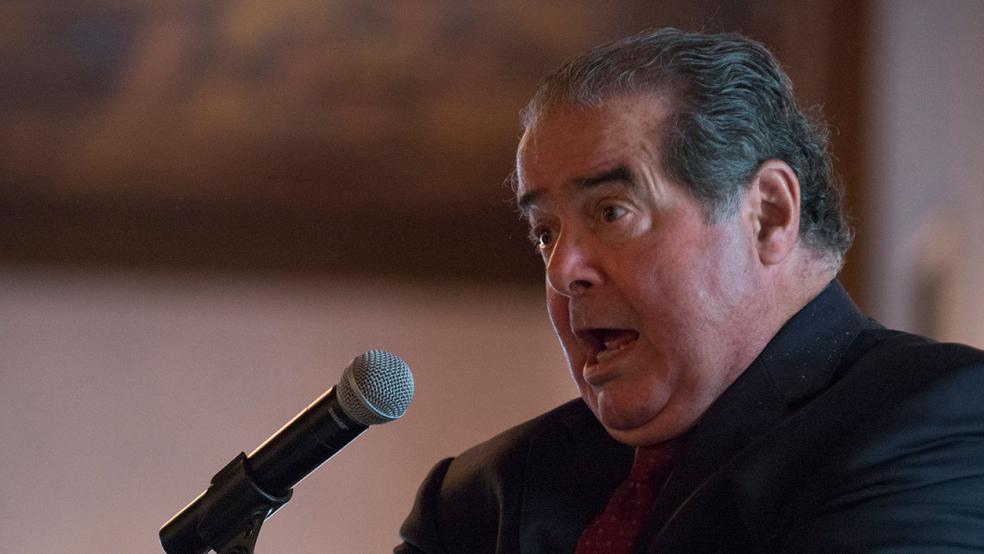Justice Antonin Scalia added his own dissent to his concurrence with the other three dissents written on Obergefell v Hodges. Yes, that’s right. Concurrence was not strong enough. The dissenting justices all felt strongly enough that each wrote his own.
Given his long history of judicial bon mot, Scalis deserved a special look. Below are some of the best lines (or paragraphs) from that dissent.
And if you don’t believe us, read it for yourself, or, maybe, “ask the nearest hippie."
- I join THE CHIEF JUSTICE’s opinion in full. I write separately to call attention to this Court’s threat to American democracy.
- So it is not of special importance to me what the law says about marriage. It is of overwhelming importance, however, who it is that rules me. Today’s decree says that my Ruler, and the Ruler of 320 million Americans coast-to-coast, is a majority of the nine lawyers on the Supreme Court.
- Buried beneath the mummeries and straining-to-be-memorable passages of the opinion is a candid and startling assertion: No matter what it was the People ratified, the Fourteenth Amendment protects those rights that the Judiciary, in its “reasoned judgment,” thinks the Fourteenth Amendment ought to protect.
- This is a naked judicial claim to legislative—indeed, super-legislative—power; a claim fundamentally at odds with our system of government. Except as limited by a constitutional prohibition agreed.
- A system of government that makes the People subordinate to a committee of nine unelected lawyers does not deserve to be called a democracy.
- Take, for example, this Court, which consists of only nine men and women, all of them successful lawyers18 who studied at Harvard or Yale Law School. Four of the nine are natives of New York City. Eight of them grew up in east- and west-coast States. Only one hails from the vast expanse in-between. Not a single Southwesterner or even, to tell the truth, a genuine Westerner (California does not count). Not a single evangelical Christian (a group that comprises about one quarter of Americans), or even a Protestant of any denomination. The strikingly unrepresentative character of the body voting on today’s social upheaval would be irrelevant if they were functioning as judges, answering the legal question whether the American people had ever ratified a constitutional provision that was understood to proscribe the traditional definition of marriage. But of course the Justices in today’s majority are not voting on that basis; they say they are not. And to allow the policy question of same-sex marriage to be considered and resolved by a select, patrician, highly unrepresentative panel of nine is to violate a principle even more fundamental than no taxation without representation: no social transformation without representation.
- But what really astounds is the hubris reflected in today’s judicial Putsch.
- The opinion is couched in a style that is as pretentious as its content is egotistic.
- It is one thing for separate concurring or dissenting opinions to contain extravagances, even silly extravagances, of thought and expression; it is something else for the official opinion of the Court to do so.
- Of course the opinion’s showy profundities are often profoundly incoherent.
- “The nature of marriage is that, through its enduring bond, two persons together can find other freedoms, such as expression, intimacy, and spirituality.”23 (Really? Who ever thought that intimacy and spirituality [whatever that means] were freedoms? And if intimacy is, one would think Freedom of Intimacy is abridged rather than expanded by marriage. Ask the nearest hippie. Expression, sure enough, is a freedom, but anyone in a long-lasting marriage will attest that that happy state constricts, rather than expands, what one can prudently say.)
- Rights, we are told, can “rise . . . from a better informed understanding of how constitutional imperatives define a liberty that remains urgent in our own era.”24 (Huh? How can a better informed understanding of how constitutional imperatives [whatever that means] define [whatever that means] an urgent liberty [never mind], give birth to a right?)
- (What say? What possible “essence” does substantive due process “capture” in an “accurate and comprehensive way”? It stands for nothing whatever, except those freedoms and entitlements that this Court really likes. And the Equal Protection Clause, as employed today, identifies nothing except a difference in treatment that this Court really dislikes. Hardly a distillation of essence. If the opinion is correct that the two clauses “converge in the identification and definition of [a] right,” that is only because the majority’s likes and dislikes are predictably compatible.) I could go on. The world does not expect logic and precision in poetry or inspirational popphilosophy; it demands them in the law. The stuff contained in today’s opinion has to diminish this Court’s reputation for clear thinking and sober analysis.




